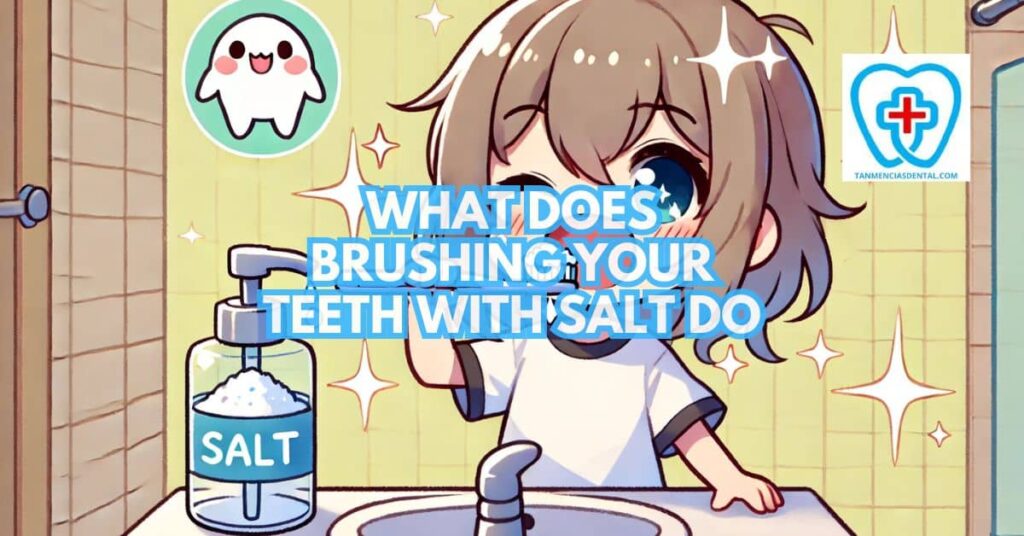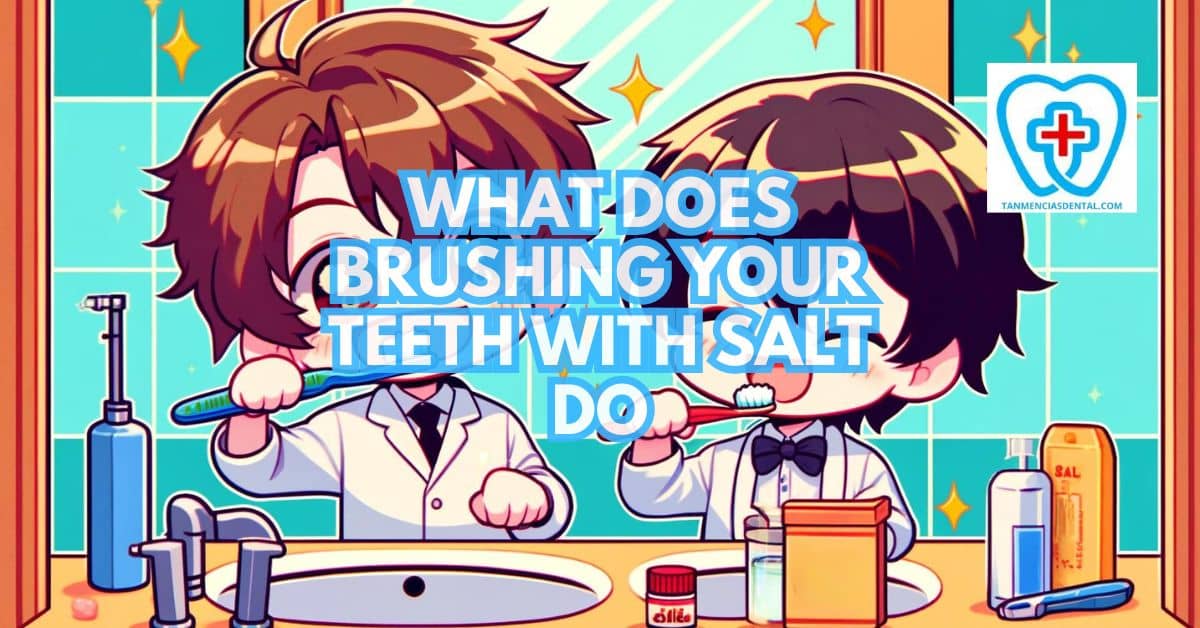Brushing your teeth with salt involves using table salt, or sodium chloride, as a natural cleaning agent for your mouth.
This practice has been used for centuries, especially in places where commercial toothpaste is not readily available.
Salt is known for its antibacterial properties, which can help reduce harmful bacteria in your mouth.
However, it’s important to understand what does brushing your teeth with salt do—both the benefits and potential risks.
We’ll take a closer look at how salt affects oral health and whether it’s a safe and effective option for your dental care routine.
1. A Tradition of Oral Care: Using Salt for Clean Teeth
The practice of brushing teeth with salt has been around for thousands of years, with ancient Egyptians, Greeks, and Romans relying on it for its cleaning and healing abilities.
Salt’s gritty texture acts as a mild abrasive, helping to remove plaque and food particles from the surface of teeth.
This can be especially helpful in reducing the buildup of harmful substances that lead to cavities.
The antiseptic properties of salt also help kill bacteria in the mouth, which can prevent infections and freshen breath.
Some people prefer using sea salt for its mineral content, believing it may offer additional benefits for teeth and gums.
Gargling with salt water is another common practice, often used to soothe gum inflammation and speed up the healing of minor oral wounds.
However, while brushing teeth with salt can be beneficial, it lacks fluoride and other ingredients found in toothpaste that help strengthen enamel and fight cavities over time.
2. Potential Benefits of Brushing with Salt:
Brushing with salt can help whiten teeth by removing stains naturally without the chemicals found in commercial whitening agents.
The slight abrasive texture of salt helps to scrub away debris, potentially leading to cleaner and brighter teeth.
Salt also alters the pH balance in the mouth, making an alkaline environment less hospitable to harmful bacteria that cause tooth decay and bad breath.
It’s a low-cost alternative, especially in situations where traditional oral care products are unaffordable or unavailable.
Nevertheless, these benefits should be carefully weighed against the potential risks of regular salt use for dental health.
🦷 How to Eliminate Bad Breath Even After Brushing Your Teeth
3. How Salt Affects the Good and Bad Bacteria in Your Mouth
Salt can help reduce the number of harmful bacteria that cause cavities and bad breath.
However, it might also kill some of the good bacteria that keep your mouth healthy.
A balanced mix of bacteria is important for preventing infections and maintaining strong teeth.
Using salt too often could disrupt this balance, leading to more oral health problems.
It’s important to use salt carefully to protect both the bad and good bacteria in your mouth.
🦷 Can an X-Ray of a Broken Tooth Reveal More Than Just the Obvious Damage?
4. Potential Drawbacks of Brushing with Salt:
The coarse texture of salt can be quite harsh on the enamel of the teeth if used frequently.
Over time, this can lead to enamel erosion, which increases tooth sensitivity and susceptibility to cavities.
Salt does not contain fluoride, a critical mineral that helps to harden tooth enamel and prevent tooth decay.
In addition, if used improperly, salt can irritate or damage the gum tissue, leading to discomfort and potential gum recession.
These drawbacks make it important to consider how often and in what manner salt is used for oral cleaning.
🦷 What Factors Do Dentists Consider When Deciding if Braces Are Needed?

5. Salt: Not a Replacement for Toothpaste
While salt may offer some benefits for dental hygiene, it is important to recognize that it cannot fully replace toothpaste.
Toothpastes are specially formulated with fluoride, which helps prevent cavities by strengthening tooth enamel.
They also often contain other ingredients like triclosan or xylitol, which combat bacteria and plaque more effectively than salt alone.
Plus, most toothpastes are designed to be less abrasive than salt, providing a safer option for daily use that won’t wear down enamel over time.
Therefore, while incorporating salt into your oral care routine occasionally can be beneficial, relying on it as your primary dental cleaning agent is not advisable.
🦷 Are Dentists Available on Weekends? How Weekend Hours Benefit Busy Patients
6. Consider Using a Salt Toothpaste for its Benefits
For those interested in the benefits of salt without the risks associated with its abrasive nature, salt toothpastes present a practical compromise.
These toothpastes blend the antimicrobial properties of salt with the protective benefits of traditional toothpaste ingredients.
Using a salt toothpaste allows for a gentler cleaning experience compared to brushing with pure salt.
Many of these products also include fluoride, ensuring that teeth remain protected against decay.
This makes salt toothpaste a suitable alternative for those seeking to enhance their oral health regimen without foregoing the essential benefits of conventional toothpaste.
🦷 What Health Issues Can Arise from Not Brushing Your Teeth?
7. How to Brush with Salt (If You Choose To)
If you decide to incorporate salt into your brushing routine, it is crucial to do so correctly to minimize any adverse effects.
First, consider using fine salt rather than coarse to reduce abrasiveness.
Mix a small amount of salt with water to form a paste, or dip a wet toothbrush into a small quantity of salt, and gently brush your teeth as you would with toothpaste.
Limit the use of salt for brushing to once or twice a week to avoid damaging the enamel.
Always follow up with a thorough rinsing of the mouth to remove any residual salt, which can be drying or irritating if left on gums and teeth.
🦷 How to Find an Affordable Oral Surgeon Without Sacrificing Quality Care
8. Regular Dental Checkups: Essential for Oral Health
No matter what materials you use for daily oral care, regular visits to the dentist are vital.
These checkups ensure that any potential issues, such as enamel wear or gum disease, are identified and addressed early.
Dentists can also offer personalized advice on the best oral hygiene practices for your specific needs, including the suitability of using salt as part of your regimen.
Additionally, professional cleanings remove plaque and tartar buildup that brushing alone, whether with salt or toothpaste, cannot eliminate.
Emphasizing the importance of these visits helps maintain overall oral health and prevent long-term dental problems.
🦷 What Are the Key Dental Tools Used for Cleaning Teeth?
9. Alternatives to Salt for Natural Oral Care
For those seeking natural methods of oral hygiene that are less abrasive than salt, several alternatives exist.
Baking soda, for example, is a mild abrasive that effectively cleans teeth while being gentler on enamel.
Herbal toothpastes and rinses that contain natural antiseptics like neem or tea tree oil can also promote gum health and combat bacteria.
Coconut oil, used in oil pulling, is another natural option that has been shown to reduce plaque formation and gingivitis.
These alternatives provide various benefits without the potential risks associated with salt, making them suitable for daily use.
🦷 Top Traits of a Child-Friendly Dentist Every Parent Should Look For
10. Children and Brushing with Salt: Not Recommended
Using salt to brush children’s teeth is generally not recommended due to their more sensitive oral tissues.
Children’s enamel is softer and more vulnerable to abrasion and chemical imbalances, making salt a potentially harmful choice.
Moreover, the absence of fluoride in salt does not support the dental development needs of growing children, who are at a higher risk for cavities.
Pediatric dentists typically recommend fluoride-containing toothpaste to strengthen young teeth and prevent decay.
For these reasons, it’s best to stick to child-friendly, fluoridated toothpaste for daily oral care in children.
🦷 Is It Safe to Brush Your Teeth with Your Fingers?
11. The Bottom Line: Brushing with Salt: Consider Consulting Your Dentist First
Before you incorporate salt into your oral hygiene routine, it’s crucial to consult with a dental professional.
Dentists can assess your overall oral health and determine if brushing with salt could be beneficial or detrimental.
They might suggest how to use salt safely or recommend other products or practices that better suit your oral health needs.
Consulting a dentist helps ensure that you’re not unintentionally damaging your teeth or gums and supports long-term dental health.
Remember, personalized advice from a professional is invaluable when considering alternative dental care methods.
👨⚕️ Conclusion
While salt can be used occasionally for oral care due to its antibacterial and whitening properties, it is not suitable for everyone and should not replace fluoride toothpaste in daily use.
The potential risks, such as enamel erosion and a lack of fluoride, make it a less ideal choice for comprehensive oral health.
If you are interested in using salt for your teeth, consider doing so under the guidance of a dentist and exploring safer alternatives like salt toothpaste.
Ultimately, maintaining a balanced approach that includes professional dental advice and regular checkups will help keep your teeth healthy and strong.
😊 Self-Promotion
Visit us at Tan-Mencias Dental Clinic, located in the heart of Parang, Marikina City, where your smile is our top priority!
Our team is dedicated to providing you with the personalized, gentle care that you deserve.
You can easily reach out to us with any questions or concerns by calling 9171451074, sending a message through our Facebook page, or using the contact form on our website.
We’re here to help guide you on your journey to optimal dental health and a brighter smile.
Book your appointment today and experience dental care tailored just for you at Tan-Mencias Dental Clinic!

